致用英语第二版第一册Unit 7
新视野大学英语读写教程第二版第一册unit_7_section_A
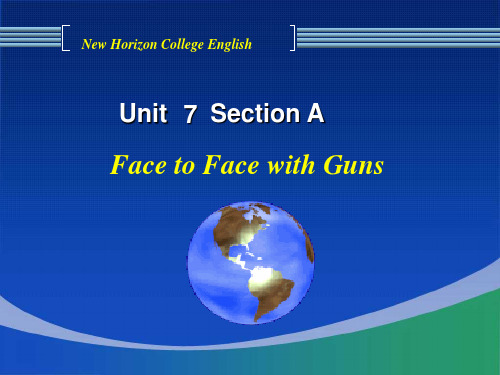
For more details
随笔
Face to Face with Guns
词汇学习
课文阅读
新视野 结 构 分 析
Back
Description of Sequential Actions (动作顺序法)
随笔
be cautious of scan the street for… pull into the garage be no exception emerge from the shrub contrive to do sth. toss my keys into a bush be attached to wires criminal trial victims of the armed attack
For more details
随笔
Face to Face with Guns
词汇学习
课文阅读
新视野 结 构ation of Narration-description-dialogue
(叙事-描写-对话结合法)
DNiarloragtuioe-nn-adriarlaotgioune: “HI’ims vnoioctelsonoakpinpgeda,t“ySotoup,”loIolikeidngasatthues.bSitgoopnleooking raitpupse.d” t(hPearwaa. t1c4h) from my wrist. (Para. 16) “DGeestcrdipowtionn. :Get down,” the thin one ordered. He gHraebwbaesdn’mt sytugplaidss.eIs’vaensdeetonsesnedoutghhemcriomnitnoatlhterilaalws tno. (kPnaorwa.v1i7c)tims of armed attacks are seldom able to identify their offenders because their attention focuses on the guns, rather than on their users. I consciously noted details of their faces. (Para. 15)
全新版大学英语(第二版)综合教程第1册Unit7AnimalIntelligence
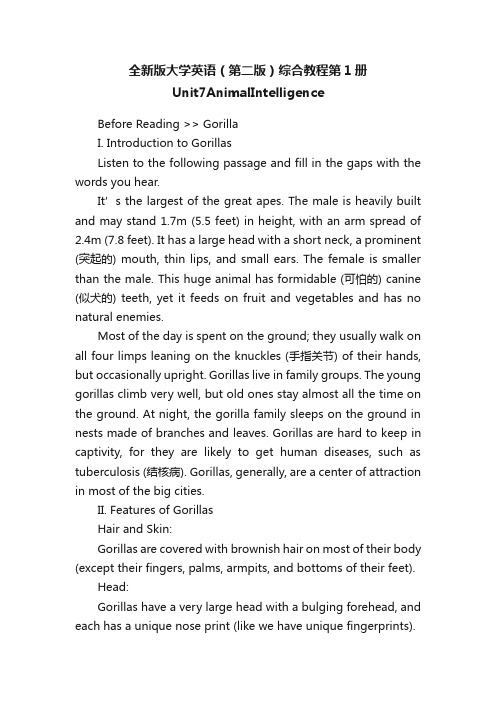
全新版大学英语(第二版)综合教程第1册Unit7AnimalIntelligenceBefore Reading >> GorillaI. Introduction to GorillasListen to the following passage and fill in the gaps with the words you hear.It’s the largest of the great apes. The male is heavily built and may stand 1.7m (5.5 feet) in height, with an arm spread of 2.4m (7.8 feet). It has a large head with a short neck, a prominent (突起的) mouth, thin lips, and small ears. The female is smaller than the male. This huge animal has formidable (可怕的) canine (似犬的) teeth, yet it feeds on fruit and vegetables and has no natural enemies.Most of the day is spent on the ground; they usually walk on all four limps leaning on the knuckles (手指关节) of their hands, but occasionally upright. Gorillas live in family groups. The young gorillas climb very well, but old ones stay almost all the time on the ground. At night, the gorilla family sleeps on the ground in nests made of branches and leaves. Gorillas are hard to keep in captivity, for they are likely to get human diseases, such as tuberculosis (结核病). Gorillas, generally, are a center of attraction in most of the big cities.II. Features of GorillasHair and Skin:Gorillas are covered with brownish hair on most of their body (except their fingers, palms, armpits, and bottoms of their feet).Head:Gorillas have a very large head with a bulging forehead, and each has a unique nose print (like we have unique fingerprints).Gorillas have senses very similar to ours, including hearing, sight (they seem to be slightly nearsighted and have color vision), smell, taste, and touch.Habitat:Gorillas are primarily terrestrial (陆栖的) (although they lived in trees back in their evolutionary past). Gorillas live in tropical rain forests (in the forest edges and clearings), wet lowland forests, swamps, and abandoned fields.Before Reading >> Killer WhaleListen to a passage and answer the questions.1. How long and how heavy is a male killer whale?(The male averages 27 feet and 11 tons.)2. How fast dose a killer whale swim?(It swims with a speed of 30 mph.)3. How many members are there in a family group of killer whale?(There are about 5 to 20 members in a family group of killer whale.)Before Reading >> English Song –BenI. Michael JacksonA Brief Introduction:Michael Jackson is more than just an extraordinarily popular singer and a wonderfully gifted dancer: he is a phenomenon that has forever left an imprint on the music industry. Chronology of Michael Jackson:— 1958Michael Jackson was born.— 1965Michael joined his brothers in the Jackson Five.Michael released his first solo album, Ben.— 1982Michael’s landmark album Thriller was released.— 1994Michael married Lisa Marie Presley, daughter of rock innovator and cultural icon Elvis Presley. — 1996Michael and Lisa Marie were divorced in an amicable manner.— 1996Michael married Deborah Rowe, an assistant to his dermatologist (皮肤科医生).— 1997His first child, Prince Michael Jackson Jr., was born.— 1998His daughter, Paris Michael Katherine, was born.— 1999Michael and Deborah got divorced.— 2000“Billie Jean,” “Rock with You,” “I Want You Back” and “Beat It” were enlisted in Rolling Stone magazine’s list of the 100 greatest songs of all time.— 2002Jackson lifted his newborn son, Prince Michael, over a hotel room terrace so fans could catch a glimpse — and was roundly criticized for endangering his child.— 2003Jackson was charged with seven counts of child sexual abuse and two counts of administering an intoxicating agent.— 2005Jackson was acquitted on all counts in the Arvizo case in thethe People v. Jackson trial in Santa Maria, California.— 2006Jackson made his first public appearance since the Arvizo trial to accept eight records from the Guinness World Records in London.— 2008Jackson issued Thriller 25, celebrating 25 years of the iconic album. The reissue reached number two in the U.S. Sony releases King of Pop, a fan-curated compilation.— June 25, 2009:Jackson died in Los Angeles at 50 after going into cardiac arrest.II. Ben(视频略)III. Questions about the Song1. What’s the relationship between Michael Jackson and Ben?2. Does Ben have any intelligence?Before Reading >> Warm-up Questions1. Do you or your family or friends have a pet, such as a dog, cat, or bird? If so, how does the pet communicate with you or them? Does the pet understand you or them?2. Do you think animals, especially very intelligent ones, have thoughts and feelings? Explain. Before Reading >> Animal RankingStudents are required to form groups to rank the following animals according to their intelligence and explain the reasons behind the ranking. Examples, anecdotes, personal experiences, scientific findings, etc. may be cited.Global Reading >> Part Division of the TextGlobal Reading >> Skimming and ScanningFill in the blanks with the information about the animals mentioned in Text A and figure out the author’s purposes.1.Colo: Broke the key chain.Author’s purpose: Animals know how to negotiate with people.2.Chantek: 1) Expanded the money supply by breaking plastic chips in two; 2) Found pieces of tin foil and tried to make copies of metal chips.Author’s purpose: Aminals can even handle the money.3.Orky: Allowed somebody to stand on his head to reach up and release the baby.Author’s purpose: Animals can assess the situation and make a right decision.4.Melati: Hid an orange in her other hand.5.Towan: Hid an orange underneath his foot.Author’s purpose: Animal intelligence can be seen in their attempts to deceive.Global Reading >> Further UnderstandingI. For Part 1 & 2 Multiple Choice1. The author writes this article in order to _______. (A)A) find out how animals use their intelligenceB) find out if animals are as intelligent as human beingsC) find out if animals do what human beings tell them to doD) find out if animals can survive better if they are intelligent2. One thing that is obvious to the author is that _______. (C)A) animals have their own thinkingB) animals do things scientists tell them to doC) animals think for their own purpose if they can thinkD) animals think when scientists want them to3. The author is convinced that when dealing with human beings, animals are _________. (B)A) less intelligent than expected B) more intelligent than expectedC) as stupid as expected D) as intelligent as expected4. Colo’s example indicates that ________. (D)A) some animals know quite well how to deceive the keepersB) some animals know quite well how to help the keepersC) some animals know quite well how to handle suspicious objectsD) some animals know quite well how to negotiate with the keepers5. Mile’s experiment to teach Chantek to share things proves to be __________. (A)A) a great success B) a blunder C) a great failure D) an unwanted thingII. For Part 3 & 4 True or False1. Behaviorists say that animals cooperate with human beings for their own benefit. (T)2. Laule believed that Orky, a killer whale, was the most intelligent animal she had ever seen. (F) (Laule believed that Orky, a killer whale, was the most intelligent animal she had ever worked with.)3. Some animals’ intelligence can be seen in their attempts to deceive. (T)4. Orky allowed somebody to stand on his head to reach up and release the baby because he had been trained to do so. (F) (Orky let somebody stand on his head to reach up and release the baby, but he had not been trained to do so.)5. Animals can learn from each other in playing some tricks. Towan is a good example. (T)Detailed ReadingI. Difficult Sentences1.the kind of mental feats animals perform when dealing with captivity and the dominant species on the planet — humans. (Para. 2)1) What do you learn from this sentence?(Animals have the abilities to deal with human beings’ captivity though human beings are more intelligent than them.)2) Paraphrase the sentence.(Animal show great intelligence when they deal with human beings’ captivity even though human beings control and dominate this planet.)3) Translate the sentence into Chinese.(即动物在对付樊笼生活和地球上的主宰物种——人类——时所表现的高超的思维技能。
致用英语综合教程智慧版第二版答案unit7

致用英语综合教程智慧版第二版答案unit71、Mary _______ Math. [单选题] *A. is good at(正确答案)B. do well inC. is good forD. is good with2、Guilin is _______ its beautiful scenery. [单选题] *A. famous for(正确答案)B. interested inC. fond ofD. careful with3、I used to take ____ long way to take the bus that went by ____ tunnel under the water. [单选题] *A. a, aB. a. theC. a, /(正确答案)D. the, a4、Grandfather lives with us. We all _______ him when he gets ill. [单选题] *A. look after(正确答案)B. look atC. look forD. look like5、20.Jerry is hard-working. It’s not ______ that he can pass the exam easily. [单选题] * A.surpriseB.surprising (正确答案)C.surprisedD.surprises6、92.China is a big country ________ a long history. [单选题] *A.hasB.haveC.with(正确答案)D.there is7、16.Lily is a lovely girl. We all want to ________ friends with her. [单选题] * A.haveB.make(正确答案)C.doD.take8、—______ do you play basketball?—Twice a week.()[单选题] *A. How often(正确答案)B. How muchC. How manyD. How long9、______ in the library. ()[单选题] *A. Don’t smokingB. No smokeC. No smoking(正确答案)D. Doesn’t smoke10、I _______ seeing you soon. [单选题] *A. look afterB. look forC. look atD. look forward to(正确答案)11、59.—Can I talk to the manager?—Please wait ________ minute. [单选题] *A.anB.a(正确答案)C.theD./12、73.The moonlight goes ____ the window and makes the room bright. [单选题] * A.acrossB.through(正确答案)C.overD.in13、15.This kind of bread is terrible. I do not want to eat it ________. [单选题] *A.any more(正确答案)B.some moreC.no longerD.some longer14、Alice is fond of playing ____ piano while Henry is interested in listening to ___ music. [单选题]A. the, /(正确答案)B. the, theC. the, aD. /, the15、Modern plastics can()very high and very low temperatures. [单选题] *A. stand(正确答案)B. sustainC. carryD. support16、( ) Do you have any difficulty _____ these flowers?I’d like to help you if you need.[单选题] *A in planting(正确答案)B for plantingC with plantingD to plant17、The rain is very heavy _______ we have to stay at home. [单选题] *A. butB. becauseC. so(正确答案)D. and18、( )He gave us____ on how to keep fit. [单选题] *A. some advicesB. some advice(正确答案)C. an adviceD. a advice19、Tony is a quiet student, _______ he is active in class. [单选题] *A. soB. andC. but(正确答案)D. or20、77.–Hey! Any idea about learning abroad? --You ()google the College Board to learn the names of college you ____ be interested in [单选题] *A. may;needB. can; might (正确答案)C. will; shouldD. shall; must21、---Where’s that report?---I brought it to you ____you were in Mr. Black’s office yesterday. [单选题] *A. ifB. when(正确答案)C. becauseD. before22、17.Joe is a good student and he is busy ______ his studies every day. [单选题] *A.inB.with(正确答案)C.byD.for23、I _______ to the tape yesterday evening. [单选题] *A. lookB. listenC. listened(正确答案)D. hear24、This kind of work _______ skills and speed. [单选题] *A. looks forB. waits forC. calls for(正确答案)D. cares for25、She found her wallet()she lost it. [单选题] *A. where(正确答案)B. whenC. in whichD.that26、_________ we don't stop climate change, many animals and plants in the world will be gone. [单选题] *A.AlthoughB.WhileC.If(正确答案)D.Until27、You wouldn' t have caught such ____ bad cold if you hadn' t been caught in ____?rain. [单选题] *A. a, /B. a, aC. a,the(正确答案)D. /, /28、You can borrow my book, _____ you promise to give it back to me by the end of this month. [单选题] *A.even ifB. as long as(正确答案)C. in caseD. even though29、_____ the plan carefully,he rejected it. [单选题] *A. To have consideredB.To considerC. Having considered(正确答案)D. Considering30、Don’t _______. He is OK. [单选题] *A. worry(正确答案)B. worried aboutC. worry aboutD. worried。
新视野大学英语第二版第一册课件unit7

scare
• 1、恐吓,使惊恐 • Be ~ to death 洗的要死 • The dog ~the thief off。 • 2 惊恐 恐吓
• You really gave me a ~
• The parents got a ~ seeing their baby climbing out of the window。
Superstition 迷信
It is a common ~that black cat is unlucky
Superstitious 迷信的
Some ~people believe in ghost
Ceremony 1、仪式 典礼 The opening ceremony will begin soon. Graduation ceremony 2、礼节 礼仪 He is a man without ~ Please do not stand on ~ 别那么客套
• 3、~away 吓走 吓跑 • Don’t speak rudely, or you will
~the customers away。
• Consult • 1、 查阅 咨询 • ~ a dictionary • I sometimes ~ my neighbor
about my English • 2、交换意见 • ~ with • We have to consult with them
• 1、在某些国家,年夜是一年中最重要的 节日,但是在美国或者欧洲则不尽然。
• 2、许多人对于这个节日的重视程度甚至 超过了东亚人对春节的重视程度。
• 3、在美国,最大,最热闹的聚会在纽约 的时代广场举行。
• 4.午夜,人们停止谈话、跳舞,收看来自 纽约的电视实况报道。
致用英语第二版第一册Unit课件

The application of key vocabulary and grammar in daily conversations is emphasized, including greetings, introductions, requests, and other common scenarios.
Core grammatical structure
01
Simple sentences
The basic structure of simple sentences is explained, including subject, predicate, object, and complement.
03
Listening and Speaking
Listening skills
Comprehension
Predicting
The ability to understand and interpret the information heard in English. This includes understanding the main idea, details, and the speaker's attitude or opinions.
the themes of the unit in class and participating in role-plays
and other interactive activities.
Overview of learning content
Unit Structure
This unit consists of five chapters, each focusing on a different aspect of The Secret Garden.
致用英语第二版第一册Unit

Listen to the song “Opportunity” and discuss what does the song try to tell us?
And so it goes another lonely day You are saving time but you are miles away Your fly was drowning in some bitter tea For seeing lost opportunity Find your mirror go and look inside And see the talent you always hide Don't go kid yourself well not today Satisfaction's not far away Hold on now your exits here It's waiting just for you Don't pause too long It's fading now It's ending all too soon you'll see Soon you'll see Your coffee's warm but your milk is sour Life is short but your here to flower Dream yourself along another day
Table of Contents
ቤተ መጻሕፍቲ ባይዱ
Where is your opportunity?
Warm-up Reading Language in Use Project Culture Tips Learning to learn Homework
第一册新教材unit7
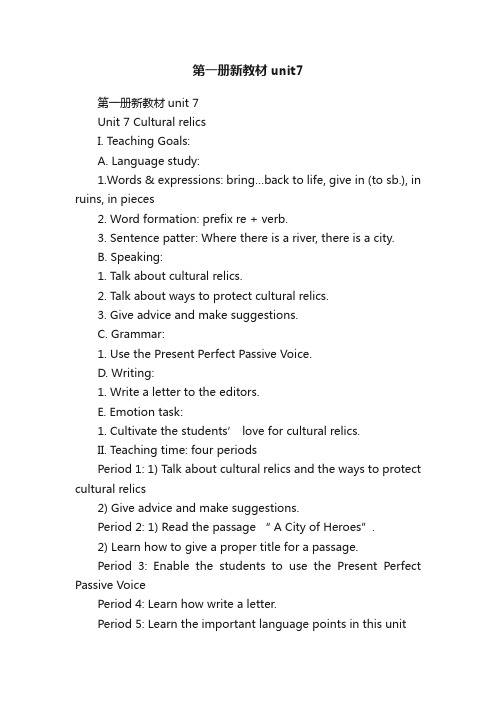
第一册新教材unit7第一册新教材unit 7Unit 7 Cultural relicsI. Teaching Goals:A. Language study:1.Words & expressions: bring…back to life, give in (to sb.), in ruins, in pieces2. Word formation: prefix re + verb.3. Sentence patter: Where there is a river, there is a city.B. Speaking:1. Talk about cultural relics.2. Talk about ways to protect cultural relics.3. Give advice and make suggestions.C. Grammar:1. Use the Present Perfect Passive Voice.D. Writing:1. Write a letter to the editors.E. Emotion task:1. Cultivate the students’ love for cultural relics.II. Teaching time: four periodsPeriod 1: 1) Talk about cultural relics and the ways to protect cultural relics2) Give advice and make suggestions.Period 2: 1) Read the passage “ A City of Heroes”.2) Learn how to give a proper title for a passage.Period 3: Enable the students to use the Present Perfect Passive VoicePeriod 4: Learn how write a letter.Period 5: Learn the important language points in this unitIII. Teaching Aids:1. a tape recorder2. a projectorThe Second PeriodI. Teaching Aims:1. Understand the main meaning of the passage.2. Learn how to find the topic sentence of each paragraph.3. Learn how to give a proper title for a passage.II. Teaching Important Points:1. How to give a proper title for a passage.III. Teaching Difficult Points:1. How to grasp the main idea of a passage2. How to find the topic sentence.IV. Teaching Methods:1. Use the Discussion method to make the students understand what they have learnt in class.2. Use pair work and group work to get every student to take part in the class activities.V. Teaching Aids:1. a projectorVI. Teaching Procedures:Step 1 Greetings and RevisionGreet the whole class as usual.T: In the last period, we learned about some cultural relics in the world. Perhaps we all know that many cities have their own cultural relics. Some cultural relics have become the symbols(象征) of the cities. Now I’ll show yo u some pictures. Please look at them and try to give the names of the cities.(Show the following slides and ask the students to give the names of the cities.)1. Eifel Tower — Paris2. The Temple of Heaven— BeijingHuai’an(Huaiyin)Paris3. Zhou Enlai Memorial —Huai’anBeijing(1) (2) (3)Step 2 Pre-readingT: Several years ago, we changed the name of our city from Huaiyin to Huai’an. Could you tell me why we did so? Yes, because Huai’an is Zhou Enlai’s hometown and Zhou Enlai is a world famous great man. Huai’an can become more famous for this great man.Of course, in the world there are many other cities that are famous for some great men or heroes.Today we are going to learn a passage about “ A City of Heroes”. Now, Who can tell me the name of the city? ( St Petersburg) (Show the following slide)A City of Heroes— St PetersburgStep 3. Showing the AimsT: In this passage we should … ( Show the following slide)Step 4 Brief introductionT: Now I’d like to talk about the passage briefly. ( Show the following slide)Brief Introduction1703St Petersburg1914Petrograd1924Leningrad1991St Petersburgthe second largest city in Russiathe largest port in Russia“the Northern Venice”Step 5. Fast Reading (Discussing)T: Now, please read the passage quickly and then try to discuss the question on the screen (Show the following slide) Fast ReadingQuestion:Who are the heroes of St Petersburg?A. Peter the Great — built the city of St PetersburgB. The people of St Petersburg —fought against the enemy and rebuilt the city of St PetersburgStep 6. Careful ReadingA. Read the passage carefully and choose the best answers: (Show the slide)Careful Reading (1)Choose the best answer:1. What is always true according to the passage?A. Where there is a river, there is a city.B. St Petersburg in Russia is on the Neva River.C. St Petersburg seems to be something out of a fairytale.D. St Petersburg is the capital of Russia.2. When did the city come back to life?A. Three hundred years ago.B. After the Russian Revolution of 1917.C. Nine hundred days after the Germans attack.D. Years after the Germans had gone.( Key: 1. B 2. D )B. Now please read the passage carefully once more and try to tell the following statements true (T) or false (F) (Show the following slide)Careful Reading(2)B. Tell the statements true (T) or false (F)1. The city of St Petersburg was rebuilt by Peter the Great. ( )2. The Germans attacked St Petersburg a hundred years ago. ( )3. A portrait of Peter the Great was destroyed by the Germans. ( )4. It was difficult for people to rebuild the old palaces. ( )5. St Petersburg will never be as beautiful as it was before. ( )( Key: 1.F 2.F 3.T 4.T 5.F )Step 7. Post-readingT: Now let’s discuss the following question in groups of four. (Show the following slide)Post-readingWhat does the passage want to tell us?(Five minutes later the following slide is shown and the students are asked to choose the best answer)Post-readingWhat does the passage want to tell us ?A. How beautiful the city is.B. How great the Russian Czars were.C. How great the people of the city are.D. How old the city is.( Key: C )Step 8. StructureT: Now please read the passage again and try to find the topic sentence of each paragraph (Show thefollowing slide) StructureTry to find the topic sentence of each paragraph:Paragraph 1: The Russian Czar Peter the Great built St Petersburg.Paragraph 2: St Petersburg has been the center of many important events in history.Paragraph 3: The people of St Petersburg rebuilt the city.Paragraph 4: The people of St Petersburg are the modern heroes of Russia.(Three minutes later, check the answers. The answers are shown on the screen above)T: Well, who could tell us where we found the topic sentence?( Paragraph 1—Middle; Paragraph 2 —Beginning; Paragraph 3 — Beginning; Paragraph 4 — End)T: Now tell me which topic sentence do you think is the most important one.( The last one. Because it is related with the title.) Yes, very good. Now let’s have a discussion: (Show the following sli de) Discussion1. What does the title of the passage imply(含义) ?After two minutes, some choices are given on the screen:Discussion1. What does the title of the passage imply(含义) ?A.There are many heroes living in the city.B.The city is very wonderful.C.Many heroes have been building the city.D.The people of the city are brave and great.( Key: D)Discussion1. What does the title of the passage imply(含义) ?A.There are many heroes living in the city.B.The city is very wonderful.C.Many heroes have been building the city.D.The people of the city are brave and great.2. Why doesn't the author use “St Petersburg” as the title of this passage?T: Well, let’s talk about the other question. (Show the slide) (Two minutes later , ask the students to give the answer to the question , like the following)Discussion1. What does the title of the passage imply(含义) ?A.There are many heroes living in the city.B.The city is very wonderful.C.Many heroes have been building the city.D.The people of the city are brave and great.2. Why doesn't the author use “St Petersburg” as the title of this passage?From the title we can know that the author is praising the people of the city instead of just introducing the city.Step 9. ConsolidationT: Now let’s go over the passage and then try to fill in the following boxes( show the slide)Three minutes later, check the answers orally, like the following:Step 10. MoralityT: What can we learn from the people of St Petersburg? (Show two mottos on the screen)MoralityWhat can we learn from the people of St Petersburg?★ “Difficulty gives in to a strong –willed man”世上无难事,只怕有心人。
《致用英语(第二版)英语报刊阅读》答案

《致用英语(第二版)英语报刊阅读》答案Unit 1Passage I1.1) fixed-asset 固定资产的2) labor-intensive 劳动密集型的3) capital-intensive 资本密集型的4) value-added 增值的2.1) Beat expectations means do better than what is expected.2) Lose stream means to go more and more slowly, or to gradually lose interest.3) Fill in the slack means someone comes to do more work to solve the problem.4) On a good track means it is going in the right direction.3.1) foster; 2) output; 3) gained; 4) rebound4.1) According to Huang Yiping, an economics professor with Peking University, and a member of the Central Bank Advisory Committee, the downward pressure will continue in the rest of this year and the next (because the economy’s traditional growth engines, such as labor-intensive manufacturing and capital-intensive heavy industries are losing stream while new engines, such as high value-added manufacturing and services, are developing but not big enough to fill in the slack).2)According to Tsinghua University’s Center for China in the World Economy, China’s growth in GDP will rebound (increase again after decreasing) to 6.9 percent from 6.8 percent expected this year (backed by a warm-up in property market and the trickle-down effect of previously-approved infrastructure projects.)Passage II1.1) Factor into means to include a particular thing in your calculations or into your considerations.2) Expectations of higher interest rates in the US that have pushed the value of the dollar higher; weaker demand abroad is also playing a role.2.1) increase: surged, raise, swelled, increase, growth, rose; decrease: declined, devalued, fell.2)the largest expansiona strong dollarwell above the average levelsthe world’s second-largestslightly more than halfto their lowest level$500 million lesshave pushed the value of the dollar higherPassage I1.transcript: an official college document that shows a list of a student’s classes and the results they receivedadulthood: the time when you are an adultgauge: to measure or calculate something by using a particular instrument or methodopaque: difficult to understand2.1) proponent; 2) excelled; 3) conceivable; 4) admissions3.1) If something is phased out, people gradually stop using it.2) Showing no difference; in agreement with3) To set a goal that is not easy to achieve4) To get rid of people or things unwanted4.1) Many American schools are phasing out class ranking systems to cut down on the hyper-competition and lessen the stress at such a critical learning point and maturation curve in kids’ lives.2) Some parents are worried that the new policy hurts high-achieving students’ chances of getting over the bar, while forcing colleges and universities to rely on perhaps less reliable or easily gauged measures or on standardized tests like the ACT or SA T.Passage II1.1) On campus, students will be limited in learning. To call the boys scholars instead of students is to promote the highest expectations: the scholars are encouraged to think beyond school, to university.2) Every school run by the city will receive a public report card, with a grade that reflects both academic performance and surveys of students, parents and teachers. Schools that do well will get a boost to their budget; the principal may get a bonus of up to $25,000 on top of a base salary of $115,000-$145,000. Schools graded D or F (about 12% of them this year) will have to submit improvement plans that will be implemented with support from Mr. Klein’s department. Principals whose schools are still faltering after two years will be fired. Schools still failing after four years will be closed.The new mayor promptly moved the schools’ headquarters from its sprawling building in Brooklyn to be next to the heart of his government in City Hall. He hired Mr. Klein, and they set about changing things—at first by taking decision-making away from the patronage-heavy local school boards, and then by decentralising it to accountable principals, and by actively piloting experimental charter schools that could be models for others. A new “leadership academy” was created to train principals. Big schools with poor graduation rates were closed, and replaced with smaller ones, often several sharing the same building once occupied by a single big school.2.Open-minded.Passage I1.1) comply with; 2) in exchange for;3) in favour of; 4) part with2.1) overturned; 2) unconstitutional; 3) proliferate; 4) exception3.1) to worry about something, especially when there is no need.2) If someone in authorities imposes a rule, punishment, tax, etc., they force people to accept it.3) to deliberately use something for the wrong purpose or for your own advantage.4) an incentive is something that encourages you to work harder, start a new activity, etc.4.1) Many inhabitants of São Paulo think their city is prettier as a result. Besides, inspired by the success of São Paulo, Rio de Janeiro, Brasilia and Porto Alegre and even Buenos Aires, capital of Brazil’s neighbour Argentina, are also discussing measures to reduce or ban outdoor ads. São Paulo set a good example to follow!2) Outdoor advertisers pay municipal authorities good money for the use of public space. They sometimes also provide cities with bus shelters, public loos and so forth in exchange for the right to place advertisements on them. This trade gives outdoor advertisers and local authorities a strong incentive to work with one another. And the more legal advertising there is, the more reluctant city governments will be to part with the revenue and services it brings. Therefore, municipal revenue will be the virtual reason for reintroducing outdoor advertising one day.Passage II1.1) Yes. Newspapers are still considered an effective medium to communicate to potential customers. Writing a press release should help in gaining free publicity. In addition, newsletters circulated through newspapers are effectively medium even in today’s world, oriented towards digital media.2) To write content that explains about business in a clear and effective manner; to have command over the language in order to create content that is both informative and catchy.2.1) With the rapid progress of Internet shopping, many business companies have started targeting their potential customers online. As a result, advertising activity is carried out not only offline and online. Online advertising more than doubles the efficiency of traditional offline advertising.2) WeChat, microblog, Twitter, MSN, QQ… (Teacher sums up after students’ discussion)Unit 4Passage I1.1) overcome; 2) exceptionally; 3) walkout; 4) commitment2.1) ostensible; 2) ratify; 3) convene; 4) eliminate31) The labor union dismissed all the protesters.2) The rank and file are the ordinary members of an organization.3) If something such as a business turns around, it becomes successful, after being unsuccessful for a period of time.4) Remove the big difference in a short time.4.1) The ostensible reason for the strike is guarantees of job security.2) UAW and GM agreed to shift GM’s liabilities for retiree health care to a Voluntary Employee Benefit Association.Passage II1.转行可从不是件易事。
新视野大学英语第二版第一册Unit7

I. Understanding
1. Put the Actions in Sequence
6 4 3 7 1 8 5 2 1) speed away 2) note details of their faces 3) toss my house keys into a bush 4) take a description of the robbers 5) pull into the garage 6) look through mug shots 7) rip the watch from my wrist 8) put his pistol between my eyes
整句话由两个分句构成。前一分句用了明喻,黑眼 睛比喻成擦亮的玻璃。后一分句属连词“as if” (好 像,似乎)从句的省略形式,这里省了“they were”, “they”是主句的主语“his arms and legs”。
1
7
Text Study—Understanding
2. What did the two robbers take away from the writer?
wallet
watch
KFC chicken
1
7
Text Study—Understanding
3. In the writer’s eyes, what damage does the out-of-control river—the young men—do to our society? They are bit by bit destroying the basic ideas we hold dear: our freedom to move about; the fruits of labor; our lives and those of people we value.
致用英语第二版第一册Unit-7知识讲解

a. Extremely satisfied. b. Fairly satisfied. c. Neither satisfied nor dissatisfied.
d. Fairly dissatisfied. e. Extremely dissatisfied.
5. How satisfied areyou with your major choice?
a. Extremely satisfied. b. Fairly satisfied. c. Neither satisfied nor dissatisfied.
d. Fairly dissatisfied. e. Extremely dissatisfied.
Warm-up Reading Language in use Project Culture tips Learning to learn homework
7. Compared to most people, you would consider yourself .
a. much more lucky b. more lucky
Warm-up
QUIZ: You and Money
How happy are you with your life? Do this quiz and find out how
happy you really are.
1. If it were possible to go back in time, how much of your life would
Table of Contents
Does money make you happy?
Warm-up Reading Language in Use Project Culture Tips Learning to learn Homework
致用英语听力教程第1册课后练习题含答案
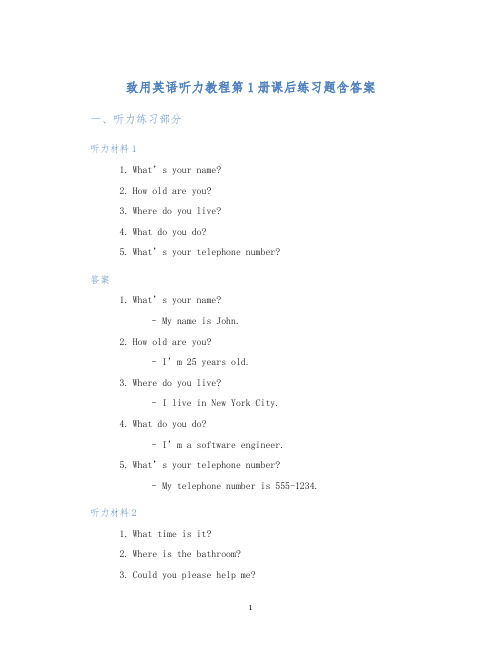
致用英语听力教程第1册课后练习题含答案一、听力练习部分听力材料11.What’s your name?2.How old are you?3.Where do you live?4.What do you do?5.What’s your telephone number?答案1.What’s your name?–My name is John.2.How old are you?–I’m 25 years old.3.Where do you live?–I live in New York City.4.What do you do?–I’m a software engineer.5.What’s your telephone number?–My telephone number is 555-1234.听力材料21.What time is it?2.Where is the bathroom?3.Could you please help me?4.How much does this cost?5.Can you speak English?答案1.What time is it?–It’s 8 o’clock.2.Where is the bathroom?–The bathroom is down the hall on the left.3.Could you please help me?–Of course. What do you need help with?4.How much does this cost?–That will be $20.5.Can you speak English?–Yes, I can speak English.二、选择题部分1.What does John do? A. He is a teacher. B. He is a doctor. C.He is a software engineer.答案:C2.Where is the bathroom? A. It’s on the right. B. It’s downthe hall on the left. C. It’s on the second floor.答案:B3.How much does the book cost? A. $10 B. $20 C. $30答案:B4.Can you speak Spanish? A. Yes, I can. B. No, I can’t. C. Ican speak a little.答案:C5.What time is it? A. It’s 7 o’clock. B. It’s 8 o’clock. C.It’s 9 o’clock.答案:B三、填空题部分1.My name ___ John.答案:is2.___ do you live?答案:Where3.How ___ are you?答案:old4.What ___ you do?答案:do5.What’s your telephone ___?答案:number。
致用英语(第二版)听力教程4 PPT课件U7
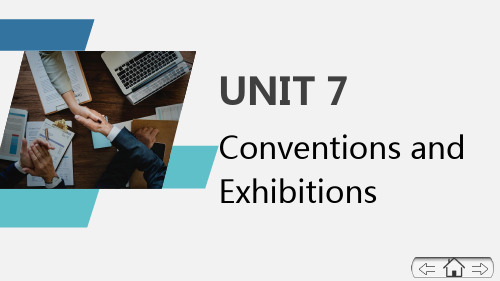
Pre-Listening
1 Script
S: What should I do with the display items? C: You can sell some of the display items. For those that you cannot sell here, you can find a transportation company to ship them back to your country. S: That sounds good. Which transportation company do you recommend? C: The organisers of the exhibition have already appointed a few transportation companies. Here are their telephone numbers. S: Thank you. I will call them in a moment.
A 2. What will Mr. Smith probably do with the display items? A. Sell some of them and ship the rest to his country. B. Give them to Miss Chen. C. Store them in the exhibition centre and come back to sell them next time. D. Sell them all.
Pre-Listening
1 Listen to the dialogues and answer the following questions.
《致用英语(第二版)》语法教程1教学课件Unit 7
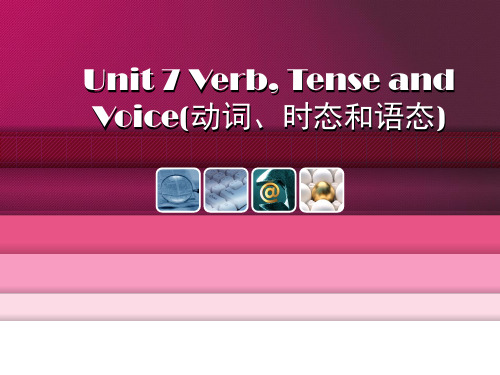
8
4 情态动词
I can swim. (表示能力) I am able to swim.(表示能力) All the people could escape from the big fire in time.(表示做某事的能力) Through his diligent work, the boy has been able to read and write in a sign language. (表示克服困难做成某事) “Can/May I sit here?” “Yes, please.” (表示请求) It can’t be our teacher who is knocking at the door. (表示对现在的否定猜测) Tom couldn’t (can’t) have written this because it is in French and he doesn’t know French. (表示对过去的否定猜测)
全新版大学英语(第二版)第一册第七单元短语总结
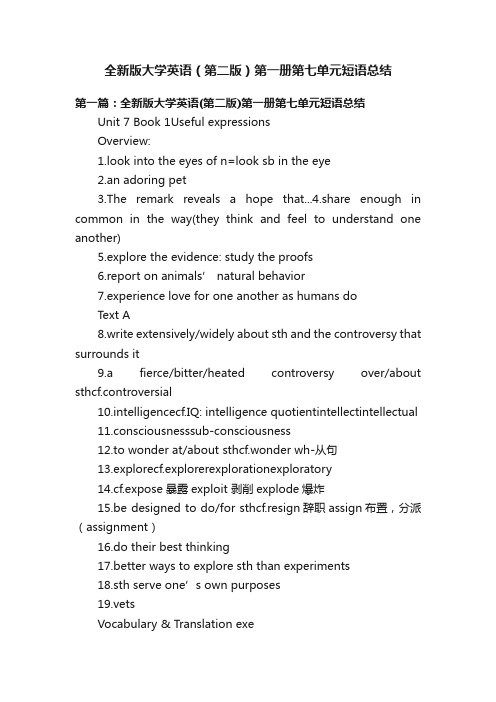
全新版大学英语(第二版)第一册第七单元短语总结第一篇:全新版大学英语(第二版)第一册第七单元短语总结Unit 7 Book 1Useful expressionsOverview:1.look into the eyes of n=look sb in the eye2.an adoring pet3.The remark reveals a hope that...4.share enough in common in the way(they think and feel to understand one another)5.explore the evidence: study the proofs6.report on animals’ natural behavior7.experience love for one another as humans doText A8.write extensively/widely about sth and the controversy that surrounds it9.a fierce/bitter/heated controversy over/about sthcf.controversial10.intelligencecf.IQ: intelligence quotientintellectintellectual11.consciousnesssub-consciousness12.to wonder at/about sthcf.wonder wh-从句13.explorecf.explorerexplorationexploratory14.cf.expose暴露exploit 剥削explode爆炸15.be designed to do/for sthcf.resign辞职assign布置,分派(assignment)16.do their best thinking17.better ways to explore sth than experiments18.sth serve one’s own purposes19.vetsVocabulary & Translation exe第二篇:全新版大学英语(第二版)第一册第二单元短语总结Unit 2 Book 2Useful expressionsOverview:1.Friendship is a topic close to all our hearts.2.the source of our happiest moments3.occasionally: now and then4.take sth too much for granted5.fail to keep sth in good repair6.illustrate sth through a tale of sth7.the lasting regret8.let sb know how much sb mean to us9.see the power of sth displayed more in actions than in words10.unfold a tale of courage and endurance11.fight to save one’s life12.vividly reflect the power of sth13.provide food for thought14.when it comes to sth15.what our friends mean to us16.a fair-weather friend17.A bank is the place where they lend you an umbrella in fair weather and ask for it back whenit begins to rain.Text A18.make an effort to keep in touch19.put off: delay: postponedoing20.plenty of time21.leave sth too late22.reach for the pen: put pen to paper: start to write23.cabbie: taxi driver: cab driver24.taxicab=taxi=cab25.all sb had=all that sb had=what sb had26.be lost in sth=be absorbed in sth=be immersed in sth=be fully occupied with sth27.tap on the windshield28.get one’s attention=catch one’s eyecf.eye-catching29.Is your cab available?30.look up at sb31.say sth to sb apologetically32.settle into the back seat33.He sounded as if he had a cold or something.34.or something/somebody/somewhere35.He was an artist or something.36.He was my uncle or somebody.37.I left it on the desk or somewhere.38.I’m in no hurry.39.go ahead and do sth40.know sth by heart=learn sth by heartcf.learn sth by rote41.Letters from home always mean a lot.42.I am on the road so much.43.Estimating that…, I guessed e to think of it, it might just as well be…45.may well do= be likely to doed to do47.I’m not much of a..: I’m not a good…48.She is a good hand at making bread.她是做面包的能手。
致用大学英语综合教程1 Unit 7 Etiquette

will be spoken only once. After you hear a question, you must choose the
best answer from the four choices marked A, B, C and D.
1. A. About 6:13, Sunday evening.
目录
02 Listening
Directions: Read the following sentences with rhythmic pattern, record the time consumption of reading each sentence and observe whether the time consumption is similar.
01 Lead-in
Directions: Watch the short video, and answer the following questions. 1. What does the video show? 2. Can you illustrate more table manners in our country?
B. About 6:30, Saturday evening.
C. About 6:30, Saturday morning. D. About 6:13, Sunday morning.
2. A. Mary and Joe.
B. Jack and Joe.
C. Joe.
D. Mary and Jack.
3. A. Because she needs to revise for her English exam.
B. Because she has to rewrite her English article.
致用英语第二版第一册Unit 7

Warm-up
Reading
Language in use
Project
Culture tips
Learning to learn
homework
Listen to two talks about British people’s lives. David Jasper works for an international company, and he’s well paid; John Cook works as an accountant. Listen and fill in the missing information. John Cook , aged 40 Work an accountant; work _________ Home life _________ children and a _________ ; relax _________ or _________ ; _________ friends twice a week Free time _________ in the restaurants; go to see _________ ; play _________ regularly; do some _________ on weekends Is he happy?
Warm-up
Reading
Language in use
Warm-up
Reading
Language in use
Project
Culture tips
Learning to learn
homework
QUIZ: You and Money
How happy are you with your life? Do this quiz and find out how happy you really are. 1. If it were possible to go back in time, how much of your life would you change? a. Everything. b. Almost everything. c. Something. d. Almost nothing. e. Nothing at all. 2. If you had enough money for plastic surgery, how much of your physical appearance would you change? a. Everything. b. Almost everything. c. Something. d. Almost nothing. e. Nothing at all.
致用英语智慧版综合教程第二版答案unit7

致用英语智慧版综合教程第二版答案unit71、How _______ Grace grows! She’s almost as tall as her mother now. [单选题] *A. cuteB. strongC. fast(正确答案)D. clever2、86.—? ? ? ? ? ? ?will it take me to get to the Golden Street?—About half an hour. [单选题]* A.How farB.How long(正确答案)C.How oftenD.How much3、While I _____ the morning paper, a headline caught my eye.. [单选题] *A. have readB. was reading(正确答案)C. had readD. am reading4、89.The blackboard is ________ the classroom. [单选题] *A.nextB.betweenC.in front ofD.in the front of(正确答案)5、Miss Smith is a friend of _____. [单选题] *A. Jack’s sister’s(正确答案)B. Jack’s sisterC. Jack sister’sD. Jack sister6、Comparatively speaking, of the three civil servants, the girl with long hair is _____. [单选题] *A. more helpfulB. extremely helpfulC. very helpfulD. the most helpful(正确答案)7、99.—Would you please show me the way _________ the bank?—Yes, go straight ahead. It’s opposite a school. [单选题] *A.inB.forC.withD.to(正确答案)8、She has no idea of what the book is about. She_______ have read it carefully. [单选题]*A. Can’t(正确答案)B. mustn’tC. shouldn’tD. needn’t9、Finally he had to break his promise. [单选题] *A. 计划B. 花瓶C. 习惯D. 诺言(正确答案)10、_____you may do, you must do it well. [单选题] *A.WhichB.WheneverC.Whatever(正确答案)D.When11、We need a _______ when we travel around a new place. [单选题] *A. guide(正确答案)B. touristC. painterD. teacher12、The boy’s mother always _______ him a story before he goes to bed. [单选题] *A. saysB. speaksC. tells(正确答案)D. talks13、The yellow bag _______ me. [单选题] *A. belong toB. belongs to(正确答案)C. belongD. belongs14、_______ after dinner is good for our health. [单选题] *A. WalksB. Walking(正确答案)C. WalkedD. Walk15、He held his()when the results were read out. [单选题] *A. breath(正确答案)B. voiceC. soundD. thought16、These apples smell _____ and taste ______. [单选题] *A. well; wellB. good; good(正确答案)C. well; goodD. good; well17、We often go to the zoo _______ Saturday mornings. [单选题] *A. atB. inC. on(正确答案)D. of18、12.Who will ________ the Palace Museum after Shan Jixiang retires? [单选题] * A.in chargeB.in charge ofC.be in charge of (正确答案)D.be in the charge of19、5 He wants to answer the ________ because it is an interesting one. [单选题] * A.problemB.question(正确答案)C.doorD.plan20、What surprised me ______ was that he succeeded. [单选题] *A. most(正确答案)B. mostlyC. almostD. at most21、( )He gave us____ on how to keep fit. [单选题] *A. some advicesB. some advice(正确答案)C. an adviceD. a advice22、_____ the project, we'll have to work two more weeks. [单选题] *A. CompletingB. CompleteC. Having completedD.To complete(正确答案)23、It’s windy outside. _______ your jacket, Bob. [单选题] *A. Try onB. Put on(正确答案)C. Take offD. Wear24、He’s so careless that he always _______ his school things at home. [单选题] *B. leaves(正确答案)C. putsD. buys25、E-mail is _______ than express mail, so I usually email my friends. [单选题] *A. fastB. faster(正确答案)C. the fastestD. more faster26、In order to find the missing child, villagers _______ all they can over the past five hours. [单选题] *A. didB. doC. had doneD. have been doing(正确答案)27、( ) They have_____ useful dictionary. They want to lend it___ us. [单选题] *A. an; forB. a; fromD. a; to(正确答案)28、I’d?like _______ the English club. [单选题] *A. to join inB. joinC. to join(正确答案)D. join in29、My brother usually _______ his room after school. But now he _______ soccer. [单选题] *A. cleans; playsB. cleaning; playingC. cleans; is playing(正确答案)D. cleans; is playing the30、9.There will be a lot of activities at English Festival nest month. Which one would you like to ________? [单选题] *A.take part in (正确答案)B.joinC.attendD.go。
致用英语第一册听力原文
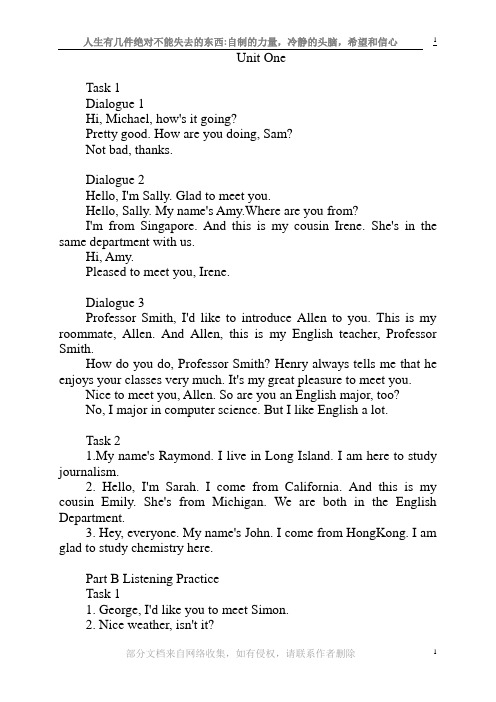
Unit OneTask 1Dialogue 1Hi, Michael, how's it going?Pretty good. How are you doing, Sam?Not bad, thanks.Dialogue 2Hello, I'm Sally. Glad to meet you.Hello, Sally. My name's Amy.Where are you from?I'm from Singapore. And this is my cousin Irene. She's in the same department with us.Hi, Amy.Pleased to meet you, Irene.Dialogue 3Professor Smith, I'd like to introduce Allen to you. This is my roommate, Allen. And Allen, this is my English teacher, Professor Smith.How do you do, Professor Smith? Henry always tells me that he enjoys your classes very much. It's my great pleasure to meet you.Nice to meet you, Allen. So are you an English major, too?No, I major in computer science. But I like English a lot.Task 21.My name's Raymond. I live in Long Island. I am here to study journalism.2. Hello, I'm Sarah. I come from California. And this is my cousin Emily. She's from Michigan. We are both in the English Department.3. Hey, everyone. My name's John. I come from HongKong. I am glad to study chemistry here.Part B Listening PracticeTask 11. George, I'd like you to meet Simon.2. Nice weather, isn't it?3. Good afternoon4. Let's get to know each other. Why don't we say a little bit of ourselves?Task 2Good morning. how can I help you?Good morning. I'm here to apply for a student ID. My name's Jessica Ross.Have you registered, Jessica?No, I haven't.Here's what you'll do. You need to get registered before having a student ID. Go to the next room and they will help you fill in the form there. Come back here after registration.OK, the next room, is that right?That's right.Thank you, madam. See you later.You're welcome. See you.1. She wants to apply for a student ID.2. No, she can’t. Because she needs to get registered first.3. To the next room.Task 3My name is Donald Trump, and I’m the largest real estate developer in New York. I own buildings all over the place, model agencies, jet liners, golf courses, casinos, and private resorts. But it wasn’t so easy. About thirteen years ago, I wa s seriously in trouble. I was billions of dollars in debt. But I fought back and I won. I used my brain, I used my negotiation skills, and I worked it all out. Now my company’s bigger than it ever was, it’s stronger than it ever was, and I’m having more fu n than I ever had.I’ve mastered the art of the deal, and I’ve turned the name Trump into a brand of the highest quality. And as the master, I want to pass along my knowledge to somebody else. I’m looking for the apprentice.Right now all over the country, sixteen of America’s best and young entrepreneurs are arriving in New York for the chance to work as my apprentice and get a first-hand look into the world of big business. They come from all walks of life. This is the chance to workfor me for a huge salary and more importantly learn enough so that maybe they too can become a billionaire some day. This is going to be the dream job of a lifetime.1. largest New York2. billions of dollars in debt3. Sixteen.Task 4When you go to job interviews, you’re often expected to introduce yourself at first. Your self-introduction plays an important role in making a good first impression on the interviewers. There is no fixed answer to what a good self-introduction is because of the differences in the companies, the interviewers and the job applicants. You might like to repeat the main points from your resume, or you might want to focus on the information that is not shown there. Whatever way you do it, my advice is that your information must be relevant to the job you apply for, or the quality they are looking for in you. At the same time, speak in a clear voice and in a friendly tone. Don’t forget your body language. A smile and eye contact will help, too.Practical Listening:Welcome to the listening course. I'm Dr. Evans. First I'd like to give you a brief introduction to this course. Listening is central to our personal, educational, social, family and professional success. This course aims at helping you develop effective listening skills, attitudes, and behaviours. There will be a study of the listening process as well as the barriers to effective listening, and there will be training activities for self-improvement in different types of listening.The required textbook for our course is Listening written by William Brown. It's available both at the bookstore and the library. You will be evaluated on your performance in class, your homework an your test grades. There will be a final examination. No mid-term, but we will have a small test during the term. All right, any questions?ListeningWilliam Brownbookstoreperformance in class testa small testUnit TwoListening SkillsTask 11. It is always good talking to you.2. I’m afraid it’s time we left.3. If we don’t leave now, I’m afraid we’ll miss the train.4. I’d better get going.5. Before leaving, I want to thank you for speaking with me.Task 2Dialogue 1W: I really had a good time tonight, but I guess I’ve got to go now, or I’ll miss the last bus. M: What time is it now?W: My watch says ten minutes to ten.Questions: What time is it according to the woman?Dialogue 2A: This is Helen. I’m calling to say goodbye.B: Hi, Helen. When do you leave?A: My flight leaves at 11:30 tomorrow morning.B: I’ll see you off at the airport.Question: When will Helen leave?Dialogue 3W: If you don’t mind, I’ll have to be leaving now. I have a class at a quarter to three.M: Oh, you’d better hurry. See you later.W: See you!Question: When does the woman’s class begin?Dialogue 4M: Thanks for inviting us, Cindy.W: I really had a wonderful time with you.M: Hey, how about coming to my place this Friday? I can pick you up at 5:20 if you have time.W: That would be great! 5:20 is fine with me.Question: When will the man pick the woman up?B Listening PracticeForrest: And one day, out of the blue clear sky, I got a letter from Jenny wondering if I could come down to Savannah and see her, and that’s what I’m doing here. She saw me on TV…running. I’m supposed to go on the number 9 bus to Richmond Street and get off and go one block left to 1947 Henry Street, Apartment 4.Old Laday: Why, you don’t need to take a bus. Henry Street is just five or six blocks down that way.Forrest: Down that way?Old Laday: Down that way.Forrest: It was nice talking to you.Old Laday: I hope everything works out for you!Core ListeningTask 1Dialogue 1M: Excuse me. Have you been waiting here for a long time?W: I’ve been here for about 15 minutes, I think.M: Does the bus here often take that long? It’s so hot here.W: Well, it depends. Usually 5 minutes will do.M: The weather changes a lot these days. When I left the hotel, the weather forecast said it would be raining, yet now how the sun is shining!W: Weather forecasts are not always reliable, you know. Oh, here comes the bus! Got to go now. Bye!M: Goodbye!Dialogue 2Tim: Jerry, I heard that you’re moving to Shanghai.Jerry: Yes, Tim. My parents are opening a new shop there.Tim: I’ll certainly miss you very much here.Jerry: I’ll miss you, too.Tim: Let’s ke ep in touch.Jerry: I’ll call you as soon as I get there.Dialogue 3A:Thank you for all you’ve done for me. I really had a wonderful time staying with you.B: It’s my pleasure. Don’t forget to drop us a line or two when you have time.A: I certainly will. Let’s stay in touch.B: Take care and have a safe trip home.Dialogue 4A: I just dropped in to say goodbye. I’m leaving for Hongkong. I’ve just found a good job there.B: Congratulations! When are you leaving?A: I’ll try to catch the 11:10 train tomor row morning.B: I wish I could see you off at the station, but I have to be on duty tomorrow.A: That’s all right. We will write to each other, won’t we?B: Sure! Have a good trip!Task 2Kate: Hey, David!Have you met my friend?David: I’m afraid I have’t.Kate: Well, this is my oldest and best friend, Nancy. She’s visiting me from her university. David: Hi, I’m David.Nancy: Hi, David. It’s nice to meet you.David: So you will be staying in our school for the weekend?Nancy: Yes, I ‘ll stay with Kate here. We are doing some catching up together. I have a lot to tell her about my new school.David: Which university are you studying at? Are you an English major like Kate?Nancy: I’m doing my undergraduate study and City University. I’m in medicine.Kate: Dav id, Nancy’s very good at writing, too. She started a poetry club when we were athigh school. (To Nancy) David loves poetry very much.Nancy: Oh, really!David: You two must have had a lot of fun together then. I always appreciate those who write good poem s. Kate, I’ll talk to you next Mondy. I’d better be going now. Nancy, nice meeting you, and enjoy your weekend here!Kate: See you later!Nancy: Thank you. Goodbye!Task 3Nowadays relatives and friends live much more spread out than before. How do people overcome long distances to stay in touch in meaningful ways?—and that means more than “Hi!” “How are you” “Everybody OK?” “Good. See ya!”Cell phones, text messages, email, and computer-generated phones are all part of a battery of weapons that help friends and loved ones stay in touch.One-on-one communication through such means helps keep relationships alive, but the vigor that flourishes in a group of folks, especially of mixed generations is hard to achieve by mail and phone. Group communication by phone is not impossible, though. For example, family members living all over the map can arrange a conference call to talk together. But the bill for doing this is often huge and therefore it is not recommended.The internet, however, provides options we never had before. Cyber communications make it a lot easier to saty in touch. And just in time, too. Families or friends can register as an e-group at “E-Groups” or other online linking services. And then when you post an email to your formed e-group, you’re p osting to everyone on the list. In effect, you have a chat room situation. Using digital photos to enhave the topic or keep the linkers updated on children’s growth and other progress can be great fun, too!Task 4In daily life people are getting more and more informal. So don’t get surprised at English native-speakers not saying “How do you do?” and shaking hands with you when you first meet. A causal “Hi” or “How are you doing?” or “Hello” often takes the place, but it means the same thing. It is neither surprising to see that the Chinese do not often greet each other any more. They just nod or smile instead. Similarly, at the end of a day, it is more often the case that you wave a cheery “goodbye” or say something informal to the whole group such as “so long everybody” than circulating about a group in the office giving each one a personal farewell.Key DPractical listeningMr. Zhang was a professor working at a university in Guangzhou. He spent four months at University of Sydney on a joint research project. He lived with a local family during his stay in Sydney, and made a lot of friends there. Before he returned home, his colleagues and friends in Sydney held a farewell party for him. And Mr. Zhou made a speech at the party: “I’d like to take this opportunity to say a few words. The four months I’ve spent here have been one of the most unforgettable experiences I have ever had in my life. Everybody I’ve met in Sydney has been so kind that I’ve really felt quite at home all the time.” Everyone here is so considerate in every way and so friendly in giving me every help I need in my work and life, that I really don’t know how I can thank you enough. I hope my host and my friends here will soon pay a return visit to Guangzhou. Now let me take this opportunity to thank you all for your hospitality and say goodbye to you all. Thank you!”Part C Fun ListeningTask 1Upside-downPhilip was the manager of a small electronics shop, where parts of electronic products were also available upon request. Once he ordered parts No. 699 from a factory. With a glance at the little box when he received it, he thought that someone had sent him parts No.669 instead. He was so angry at the factory’s incompetence that he immediately sent the box back without opening it, along with a letter giving them a piece of his mind. A few days later, Philip received the same box back, with a letter that contained just four words: “TURN THE BOX OVER”. It was not until he opened the box that he realized he was the one who had made a mistake.KeyPhilip was careless. The parts he received were right, but he held the box upside-down and mistook 699 to 669.Task 2It won’t be easy, you’ll think it strange 这并不容易,你们也会诧异When I try to explain how I feel 我努力说出我的感受That I still need your love after all that I’ve done 因为即使今天,我仍然需要你们的爱You won’t believe me 你们不会相信All you will see is a girl you once knew 今天你们看到的,不过是曾经认识的小女孩Although she’s dressed up the nines 虽然穿着大人的衣服At sixes and sevens with you 举止思想依然幼稚I have to let it happen, I had to change 我别无选择,我只能抗争Couldn’t stay all my life down at heel 无法忍受草根生活Looking out of the window, staying out of the sun 呆望窗外,不见天日So I chose freedom 所以我选择了自由Running around, trying everything new 四处游历,不断尝新But nothing impressed me at all 但我并未遇到惊喜I never expected it to 我本来也没有奢望Don’t cry for me Argentina 阿根廷,别为我哭泣The truth is I never left you 我对你不离不弃All through my wild days, my mad existence 无论潦倒,无论疯狂I kept my promise, don’t keep y our distance 我已信守诺言,请不要舍我而去And as for fortune, and as for fame 至于荣华,至于名利I never invited them in 我从未苛求Though it seemed to the world 虽然世人眼中They were all I desired 这是我唯一的目标They are illusions 它们不过是浮光幻影They’re not the solutions they promise to be 并非灵丹妙药The answer was here all the time我的答案一向都是:I love you and hope you love me 爱人,并希望人亦爱我Have I said too much? 我是否说得太多?There’s nothing more I can think of to say to you 其他的,暂时也想不起来But all you have to do is look at me to know 你们看着我,就会明白That every word is true 发自肺腑,字字真言Unit 3 Congratulations and Good WishesPart A Listening SkillsTask 11. Let me congratulate you on your success.2. I wish you the best of health.3. I hope you enjoy the film.4. Take care of yourself.5. Have a good time. Thank you.Task 2Dialogue 1W: I hear you’re going to travel to Tibet next week.M: Yes, I have been hoping for such a trip for a long time.W: I envy you. Tibet is such a beautiful place. Have a great trip.M: Thank you.Question: What is the man going to do?Key He is going to travel/have a trip to Tibet.Dialogue 2M: How did you do in your final exam?W: I got an A! I really can’t believe it.M: You deserve it. I know how hard you’ve worked for it. And I’m so happy for you. W: Thank you.Question: How did the woman do in the final exam?Key She got an A/ did a good job/ did very well in her final exam.Part B Listening PracticePre-listeningWe Wish You a Merry ChristmasEnyaWe wish you a merry Christmas;We wish you a merry Christmas;We wish you a merry Christmas and a happy new year.Good tidings we bring to you and your kin;We Wish You A Merry Christmas and a happy new year;We all want some figgy pudding;We all want some figgy pudding;We all want some figgy pudding, so bring some right here.We won’t go until we get some;We won’t go until we get some;We won’t go until we get some, so bring some right here.We wish you a merry Christmas;We wish you a merry Christmas;We wish you a merry Christmas and a happy new year. Core ListeningTask 1Dialogue 1M: Do you know it’s Ally’s birthday tomorrow?W: Hey, you’re right. Hmm, it’s too late to send a card. Well, let’s do something for her. M: How about a surprise party?W: That’s a great idea. Let’s get started.Question: What are they going to do?Key CDialogue 2W: It’s said that you’re moving to a new apartment soon.M: Yes. I was selected as director of the new branch of our firm in another city, so we will move there pretty soon. And you know, Kate has been longing for a bigger apartment for a long time.W: Yeah, she must be very happy now. Congratulations on your promotion.Question: What do we know about the man?Key BDialogue 3W: Hi! Jack, I just came back yesterday. Anything new while I was away?M: Congratulations, Susan. It’s said you’ll be promoted to manager and become my immediate boss.Question: What is the most probable relationship between the two speakers at the moment? Key DDialogue 4M: Our football team has just won the league final match!W: Wow, we have become the league champion for the fourth time!M: Cheers!Question: How many times before has the school football team won the league championship?Key BTask 2A recent survey from America Online’s Tegic Communications shows that a “surprising number of p eople” in America and Europe are sending Christmas and New Year greetings by text messaging rather than through conventional paper cards via the mail. The survey is based on data from the U.S. and five countries in Europe. When mobile users were asked whether they have or would send a “Merry Christmas” text message, the following percentages in an array of countries said yes, including:The U.S., 39 percentThe U.K., 56 percentFrance, 66 percentGermany, 79 percentSpain, 88 percentItaly, 91 percentIn ad dition, the figures about sending a “Happy New Year” text message were roughly equivalent. Other similar surveys show the increasing popularity of the text messaging as well.A report from the wireless provider Alltel indicates that text messaging increased by 154 percent during the last year.The wireless company said that in the month of June this year, 7.2 billion text messages were sent, a huge increase from the 2.8 billion sent a year earlier.Task 3Have you ever heard others saying “cross your fingers” or “I’ll keep my fingers crossed for you”? The phrase “cross one’s fingers” may leave some people scratching their heads. This phrase is a wish for good luck. It has something to do with the old belief in the strongpower of the Christian cross. For those living in the old times, they thought witches and ghosts existed in the real world and they blamed illness and bad luck on evil forces. The cross, they believed, could provide them protection and ward off the evil influence. Normally, making the sign of the cross involves four steps --- touch the forehead, heart, left shoulder, then right shoulder with your right hand. However, one can make a cross shortcut by curling the middle finger over the index finger of one hand.Although superstitions about the witches and the evils slowly die, the phrase “cross one’s fingers” lives on. It is used for such a long time that it has become an idiom not only used by Christians but also those who do not believe in God.Key1. good luck2. protect them/ provide them protection3. To curl the middle finger over the index finger of one hand.4. Yes.(It is used by Christians and non-Christians as well.)Task 4Failure, often taken as a negative part of life, can be a way towards success if you think it in another way. Successful persons are those who take failures wisely. Edison, the inventor of the light bulb, had made hundreds of models that failed before he found the right way to make one. But he din’t allow himself to be down every time his experiment failed. Instead, he encouraged himself by thinking that he had just found another way that didn’t work, and had moved one step closer to making the right one. When you have a difficult time, don’t lose heart. Think about your failure. What caused it? What can you learn from it? What can you change so that things will improve next time? Probably you will find that failure can really teach you a lot.Key 1. A 2. CPractical ListeningIt is reported that some 14 billion greeting text messages were sent during the week-long Spring Festival. The figure meant excellent income for professional message writers who write for the websites that provide downloading services for cute message seekers. According to an employee of China Mobile (one of China’s top two telecom munications operators), some productive text message writers earned more than 10,000 yuan in the week, equivalent to their average monthly income.Subscribers want cute, ingenious messages to extend greetings and bring joy and fun to their friends, so message writers must have a good command of the language, said a text message writer surnamed Chen. He also said that message writers must have basic training in art and music in order to produce multi-media messages.Key1. About 14 billion text messages were sent during the week-long Spring Festival.2. This brought excellent income for professional message writers.3. Some productive text message writers earned more than 10,000 yuan in the week.4. Message writers must have a good command of the language.5. Message writers must have basic training in art and music in order to produce multi-media messages.Unit 4 ApologiesPart A Listening SkillsTask 11. Jane can’t arrive here on time because of the heavy traffic.2. Carl didn’t feel very well, so he didn’t go to the concert.3. Our flight is delayed due to a problem with the wings of the plane.4. Jane asked me to stay, for she knew I was free the next day.5. The rain suddenly poured down when I was walking, which made me wet through.Key 1. R 2. R 3. C 4.R 5.RTask 2Dialogue 1M: All the guests have left. It’s just the two of us now. Shall we have a dance?W: Shall we go for a walk instead? I’m afraid the music is too loud.Question: Why doesn’t the woman want to dance?Key CDialogue 2W: You didn’t drive to your office this morning. Is something wrong with your car?M: No, it’s just that I felt drowsy this morning as I took some medicine last night, so I think I’d better not drive today.Question: Why didn’t the man drive to work?Key APart B Listening PracticeCore ListeningTask 1Dialogue 1Kate: I’m sorry for the noise, Mary. I didn’t know that you were taking a nap when I played the music.Mary: It’s all right, Kate.Question: What did Kate do?Key BDialogue 2M: Excuse me, madam.W: Yes, can I help you?M: I bought a watch here a week ago, but the second hand’s off already.W: I’m sorry about that. Let’s see what we can do here.M: I’d like to have my money back.W: I’m terribly sorry, but you’ll have to see the manager for a refund.Question: What did the man want to do?Key BDialogue 3Ally’s mother: I’m very sorry to have given you so much trouble, Mrs. White. I really didn’t know that I had to be on duty today.Mrs. White: Don’t worry about that. Ally is such a lovely little girl and we all love to be with her.Ally’s mother: Thank you so much for taking care of her. Thank you so much.Mrs. White: You are welcome.Question: What did Mrs. White probably do that day?Key CTask 2M: Excuse me. Have they started boarding for the flight to London?W: Flight BA 170 to London, sir?M: Yes, ma’am. When can passengers begin to board? I have been waiting here for quite a while.W: Oh, I’m sorry. But this flight is delayed.M: What? It is delayed? How come we got no notice?W: I’m very sorry for the inconvenience. Moments ago there was an announcement. The flight is delayed due to a sudden rainstorm.W: How long will we have to wait?M: I’m terribly sorry, but I really don’t know for sure now. I’ll keep you informed as soon a s possible.Key1. A passenger and a clerk at the airport.2. His flight is delayed and he gets no notice.3. A sudden rainstorm.4. No, she can’t. She will keep the man informed as soon as possible.Task 3For many of us apologizing can be a difficult thing to do. However, our level of discomfort is usually relative to the offence.Most of us have no problem saying “I’m sorry” when we accidentally bump into someone on the street. In fact that type of situation is so common to us that the ensuing apology has become a reflex --- an automatic response with natural timing. But what will happen when we have to think about apologizing?When we start to think about the apology, we also think the behavior or actions that led up to it. As a result, our thoughts, emotions and pride become part of the mix and we often feel embarrassed and a sense of shame and discomfort with the situation which then translates itself into not knowing how to apologise.The good news is that if we messed things up all the time, we would know exactly what to say and how to apologise --- just like we do when we bump into a stranger. The fact that we are not sure how to say sorry means that most of the time our behavior is pretty much on the right track.Key 1. T 2. F 3. T 4. FTask 4According to Maria Neuman, an American writer, an apology can be incredibly powerful, both for the one who makes it and the one who receives it. An honest apology can mend relationships, dissolve anger, or heal a broken heart. Apologizing can even have health benefits, such as lowering stress levels, as indicated by a study conducted by the University of Michigan. Meanwhile, avoiding an apology makes relationships more strained --- and it can reveal something negative about you. Being incapable of apologizing can be a real character flaw, according to Beverly Engel, a psychotherapist and author of The Power of Apology (John Wiley & Sons, 2001). It is necessary to know when you’re in the wrong, how to say it in the right way, and stop apologizing when you are not to blame, or when the apology is harshly rebuked. The three keys to a successful apology are regretting your actions, taking responsibility for your fault and being willing to remedy the situation.Part C Fun ListeningTask 1Have you noticed that many Japanese people mention words of apology easily? In my case, when I don’t understand some English sentences, I often say unintentionally, “Sorry, I’m poor at hearing English. I don’t understand. ” I do actually feel bad that they must be patientw ith my poor English. But I know that I say “Sorry” not only as a real apology, but also it is the Japanese way.In daily life we apologise without thinking deeply. For one reason, I think we are not willing to express apology to others; this tendency is one part of our Japanese national character. And we haven’t had the background of lawsuit-active society like America. Before I came to America from Japan, I heard that we must not apologize even if we have a car accident.Another reason why we easily say “Sorry” has to do with the Japanese language. There is one word “sumimasen” that can mean “thank you”, “excuse me”, and “sorry” all at the same time. The weight of each of these meanings depends the situation. For example, if a child gets an unexpected prese nt, we would say, “sumimasen”, meaning mostly “thank you”. But we also might say, “Sumimasen, can you tell me how to find the library?” Here, we mostly mean “excuse me”. Because this word is ambiguous, it is very convenient. But when I translate this word into English, I just say, “sorry”, not its whole, complex meaning.I like the Japanese way of communication. But I think in American I should be careful not to apologise too much, because I’m afraid the Japanese modest way sometimes makes Americans feel strange. Moreover, it is subject to being misunderstood as a lack of self-confidence or misunderstanding.Unit 5 ThanksA listening SkillsTask 11.My mother was born in a small town in northern Italy.2.Li Ming was three when his parents immigrated to America.3.They lived in Chicago for ten years.4.Lucy’s grandmother once worked in the ice cream factory.5.At 16,Caroline graduated from her high school class.Task 2Dialogue 1M: Thank you for the wonderful party and delicious food.W: Oh, I’m glad you like it.M: I really had a good time. Thanks a lot, see you.W: Thank you for coming.。
致用英语第二版第一册Unit

looks very attractive but should not be taken and vice versa.
It’s great to have an adviser or people that you can trust to
be able to bounce ideas off and seek their advice. Having these
Warm-up
2. Know the costs. I don’t just mean financially. Don’t just jump on every
opportunity that comes your way. Find out what the costs, risks, and rewards are before you do anything. If you are able to live with the risk, even if it fails, then it might be something that you want to do. Whatever you do, don’t blindly jump into something without knowing where or how you are going to land. 3. Keep an open mind.
Never miss opportunity
Don't be scared of what you cannot see
Your only fear is possibility
Never wonder what the hell went wrong
Your second chance may never come along
- 1、下载文档前请自行甄别文档内容的完整性,平台不提供额外的编辑、内容补充、找答案等附加服务。
- 2、"仅部分预览"的文档,不可在线预览部分如存在完整性等问题,可反馈申请退款(可完整预览的文档不适用该条件!)。
- 3、如文档侵犯您的权益,请联系客服反馈,我们会尽快为您处理(人工客服工作时间:9:00-18:30)。
Warm-up
Reading
Language in use
Project
Culture tips
Learning to learn
homework
Possible interpretation of the quiz.
• More a than e: Your score indicates that you are quite happy with your life. Even if it didn’t turn out exactly how you pictured it would, there are likely very few things you’d change—or regret doing! • Almost all c: Your score indicates that you are generally happy with your life, but there may be some things that you wish you could change or improve. Whatever the case, there are steps you can take to turn that occasional frown upside down. • More e than a: Your score indicates that overall, you are rather unhappy with your life. Perhaps you’ve recently gone through some tough times, or you’re simply having a bad day. Whatever the case, there are steps you can take to turn that frown upside down.
Warm-up
Reading
Language in use
Project
Culture tips
Learning to learn
homework
QUIZ: You and Money
9. Your overall stress level is . a. extremely high b. fairly high c. moderate d. fairly low e. extremely low 10. Taking everything into consideration, how satisfied are you with your life in general? a. Extremely satisfied. b. Fairly satisfied. c. Neither satisfied nor dissatisfied. d. Fairly dissatisfied. e. Extremely dissatisfied.
Warm-up
Reading
Language in use
homework
QUIZ: You and Money
How happy are you with your life? Do this quiz and find out how happy you really are. 1. If it were possible to go back in time, how much of your life would you change? a. Everything. b. Almost everything. c. Something. d. Almost nothing. e. Nothing at all. 2. If you had enough money for plastic surgery, how much of your physical appearance would you change? a. Everything. b. Almost everything. c. Something. d. Almost nothing. e. Nothing at all.
Warm-up Reading Language in use
Project Culture tips Learning to learn homework
致用英语 综合教程
1
Unit 7 Does money make you happy?
Second edition
外语教学与研究出版社
Warm-up
accountant. Listen and fill in the missing information. David Jasper , aged 45 Work a lawyer; work _________ hours Home life _________ children; _________ see his children; _________a house in the suburb of Dallas; his wife _________ Free time play _________ not often, _________ to do leisure activities Is he happy?
Warm-up
Reading
Language in use
Project
Culture tips
Learning to learn
homework
QUIZ: You and Money
3. If you were to compare your idea of the “perfect life” to your current circumstances, how close would you presently be to the ideal? a. Extremely close. b. Fairly close. c. Somewhat close. d. Slightly close. e. Not at all close. 4. How satisfied are you with your personal relationships overall (e.g. with your family, friends, significant others)? a. Extremely satisfied. b. Fairly satisfied. c. Neither satisfied nor dissatisfied. d. Fairly dissatisfied. e. Extremely dissatisfied. 5. How satisfied areyou with your major choice? a. Extremely satisfied. b. Fairly satisfied. c. Neither satisfied nor dissatisfied. d. Fairly dissatisfied. e. Extremely dissatisfied.
Reading
Language in use
Project
Culture tips
Learning to learn
homework
Does money make you happy?Fra bibliotek Warm-up
Reading
Language in use
Project
Culture tips
Learning to learn
Warm-up
Reading
Language in use
Project
Culture tips
Learning to learn
homework
Listen to two talks about British people’s lives. David Jasper works for
an international company, and he’s well paid; John Cook works as an
Warm-up
Reading
Language in use
Project
Culture tips
Learning to learn
homework
QUIZ: You and Money
6. In terms of your outlook on your life, you would categorize yourself as . a. a total optimist b. a total pessimist c. somewhat in between 7. Compared to most people, you would consider yourself . a. much more lucky b. more lucky c. just as lucky d. less lucky e. much less lucky 8. The goals that you set for yourself are generally . a. easy to achieve b. challenging but achievable c. very difficult to achieve d. I don’t set goals for myself
Warm-up
Reading
Language in use
Project
Culture tips
Learning to learn
homework
QUIZ: You and Money
How happy are you with your life? Do this quiz and find out how happy you really are. 1. If it were possible to go back in time, how much of your life would you change? a. Everything. b. Almost everything. c. Something. d. Almost nothing. e. Nothing at all. 2. If you had enough money for plastic surgery, how much of your physical appearance would you change? a. Everything. b. Almost everything. c. Something. d. Almost nothing. e. Nothing at all.
